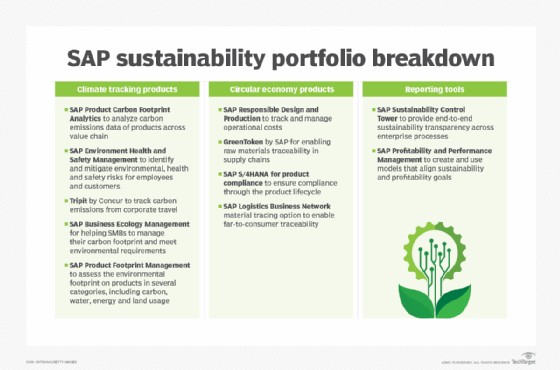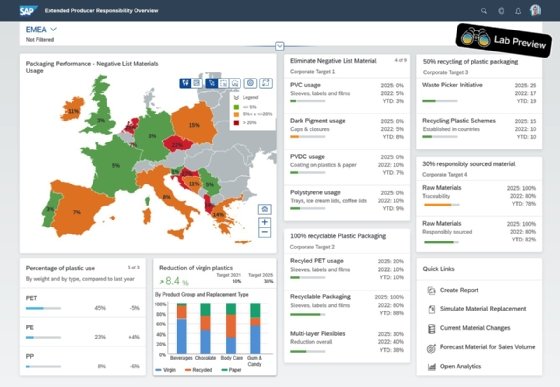
Getty Images
SAP makes play to be core of corporate sustainability efforts
SAP debuted sustainability products so that companies can measure and manage carbon emissions and participate in the circular economy. But are customers ready?
SAP is trying to make the case to its customers that good sustainability practices make for a healthier and more profitable business.
At the recent Sapphire Now 2021, SAP CEO Christian Klein emphasized the need for businesses to focus on sustainability issues, stressed the urgency of the problem, and talked about how SAP plans to provide the technology needed to manage and measure their initiatives.
"We must act now on sustainability with the goal of zero emissions, zero waste and zero inequality," Klein said. "It's time to build sustainability into the fabric of how we do business. It's time to make sustainability a standard part of corporate management like productivity or growth. But you can't act on what you can't measure."
At the virtual event, SAP announced a portfolio of products designed to foster the ability to measure sustainability practices such as enabling a circular economy in the enterprise, where products are designed and manufactured to be kept in circulation as long as possible.
The portfolio is based on products such as S/4HANA and the SAP Business Network, and the products are aimed at two aspects of sustainability -- climate tracking of a company's carbon footprint across the enterprise and enabling the circular economy, as well as providing overall reporting capabilities. The carbon footprint products build on SAP's Climate 21 initiative, which debuted at Sapphire Now 2020.
The benefits of being more environmentally conscious extend beyond better business practices, according to Daniel Schmid, chief sustainability officer at SAP. It can also help attract investors and a generation of employees that expects to work for a responsible company, he said.
"You have to make the business case and show that sustainable practices, like being more energy efficient, can save money," he said. "You have to make your company more attractive to the green investor community, and you have to make your company attractive to employees as an employer. In our latest employee survey, 94% told us how important it is for SAP to pursue sustainability."

Embed sustainability in processes
Earlier this year, systems integration partner Accenture embarked on a partnership with SAP to help companies build sustainability practices across their business operations.
Accenture and SAP are co-developing SAP's sustainability products, including SAP Responsible Design and Production, said Stephanie Guimbellot, managing director for the Accenture SAP Business Group.
A large percentage of SAP transactions involve generating CO2 emissions, so it's important to connect this data and measure the value, she said.
"It's about putting a value on these, extracting all the information from the data flow, information production flow, supply chain flow, and being able to do calculations of climate impacts starting with carbon footprints," Guimbellot said "The objective is to extend to the financial ledger with a 'green ledger,' and for that you need the lowest level of granularity."
But tracking carbon emissions is just one piece of the sustainability portfolio. SAP and Accenture are also focused on the circular economy, which focuses on designing and packaging products in a way that keeps them in circulation as long as possible. To participate in the circular economy, companies will need to adopt new business practices. For example, they will need to establish a reverse supply chain if they want consumers to return products or packaging for reuse or refurbishing.
Enterprise applications can play a vital role in enabling this, said Caspar Borggreve, global lead for the Accenture SAP Business Group.
"There's a lot to the circular economy -- track and trace, digital product identity, the reverse supply chain of materials, optimizing the manufacturing process -- that are part of the circular economy work Accenture is developing with SAP," Borggreve said. "This is not just about the analytics, that's the easy part, but embedding it into the processes is where SAP is trying to take it."
Indeed, that's the road SAP is taking, according to Schmid. Sustainability is now embedded in SAP's core business strategy, which he believes is critical.
"Embedding sustainable data criteria in our entire solution portfolio makes a huge difference," Schmid said. "Because the decision-makers in the companies have both the financial and non-financial data being combined, they can make simulations with this data and make the right decisions to manage their sustainability performance."

Modernizing for sustainability
While there are definite benefits to sustainability efforts, both from a moral and business perspective, there's also the significant matter of cost, according to Borggreve. Businesses may need to bring in data analysts to work with the sustainability products; manufacturers may need to install new monitoring systems or retrofit old machinery to meet new requirements; and employees will need to be trained on sustainability best practices.
Borggreve likens these sustainability costs to efforts to modernize enterprise systems, and said that companies should try to get achievable wins first in sustainability efforts.
"The path will be different for different companies, there's not going to be a one-size-fits-all answer," he said. "Companies that are seeking to make an immediate change will take more of an analytics approach, however, as companies are making the move from SAP ECC to S/4HANA and they're modernizing their landscapes, they should think and design with sustainability in mind."
Not a greenwashing
Some believe SAP is Greenwashing and using sustainability to gain likes, but Joshua Greenbaum, principal analyst and founder of Enterprise Applications Consulting in Berkeley, Calif., doesn't believe that's the case.
"There's always a danger that this is greenwashing, and it definitely smells like it at times," Greenbaum said. "But SAP does come to it with a degree of honesty that's something more significant than any particular greenwashing or virtue signaling."
Other critics question whether the messaging will resonate with SAP customers, but Greenbaum said sustainability is increasingly hitting the mark in corporate boardrooms. One recent example is the launch of the Ford F-150 Lightning, the all-electric version of Ford's popular pickup truck.
"It's a huge issue now, regardless of how cynical you want to be about a lot of corporations trying to do a better job with their energy lifecycles and raw materials lifecycles," Greenbaum said. "There are a lot of companies responding to this, and the carbon lifecycle is becoming more and more top-of-mind among corporate executives."
Still, SAP runs a risk of being too far in front of where its customers are on the issue, said Jon Reed, analyst and co-founder of Diginomica.com, an enterprise computing news and analysis site.
Many SAP customers are more focused on issues like how to recover from the COVID-19 pandemic than implementing sustainability programs, Reed said.
"Sustainability is one of the few topics where you can point to the history of SAP that they really care about, but there's an international SAP audience, for example, that includes India as a major component," he said. "They're in the throes of a pandemic crisis right now, and if you don't frame the sustainability conversation correctly, you run the risk of sounding tone-deaf and above the fray."
Many of the measures that can help companies improve sustainability can also help with the recovery, and SAP needs to help customers connect the dots.
"You have to put the idealism aside a bit and realize that right now companies are figuring out how to survive and transform," he said. "It's the right conversation to be having, but SAP needs to frame it in a way where people can relate to it and then make [it] very practical on [how] people can better understand their consumption and how sustainability can save money."
Jim O'Donnell is a TechTarget news writer who covers ERP and other enterprise applications for SearchSAP and SearchERP.







